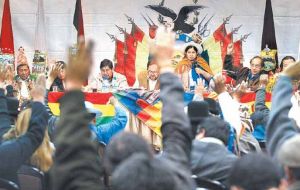MercoPress. South Atlantic News Agency
Bolivian assembly approves new draft constitution
 Bolivian Congress
Bolivian Congress A special Bolivian constituent assembly approved this weekend a new draft constitution, despite a boycott by the main opposition party. Bolivians will now have a chance to vote on the changes in a national referendum next year.
The 164 deputies present, out of the total of 255, who had moved to the city of Oruro took 13 hours to vote on each article of the new constitution. Some of the controversial reforms of the new charter include consecutive presidential terms, turning the bicameral legislature into a one-house body and granting Indian communities and provinces more autonomy from the central government. The draft constitution has proved contentious in Bolivia, with strikes and protests against it. At least five people were killed and hundreds injured in the run up to the vote in clashes between protesters and police in the central city of Sucre. Residents of that town were angered at the absence from the constituent assembly's agenda of proposals to make Sucre the sole capital of the country, which it was before 1899. Currently, the judiciary rests at Sucre while the legislative and executive branches of government remain at La Paz in the west. But critics insist Morales is using the assembly to grab more power and make radical reforms. The argument highlights the division between opponents of President Evo Morales, based in the richer east and his supporters in the poorer mountainous west of Bolivia. President Morales proposed on Wednesday that he step down if "No" votes in the upcoming referendum exceed the vote which elected him in December 2005 - 54%. Mr Morales - Bolivia's first indigenous president - says the reforms would give greater political representation to marginalized and indigenous groups - who make up 62% of the population. Strikes to protest against the reform plans were held in six of Bolivia's nine provinces last month, attracting the strongest support in the gas-rich province of Santa Cruz - an opposition stronghold. Bolivia's largest opposition force, the rightist Podemos party, did not attend this weekend sessions apparently in a boycott of the proceedings.




Top Comments
Disclaimer & comment rulesCommenting for this story is now closed.
If you have a Facebook account, become a fan and comment on our Facebook Page!